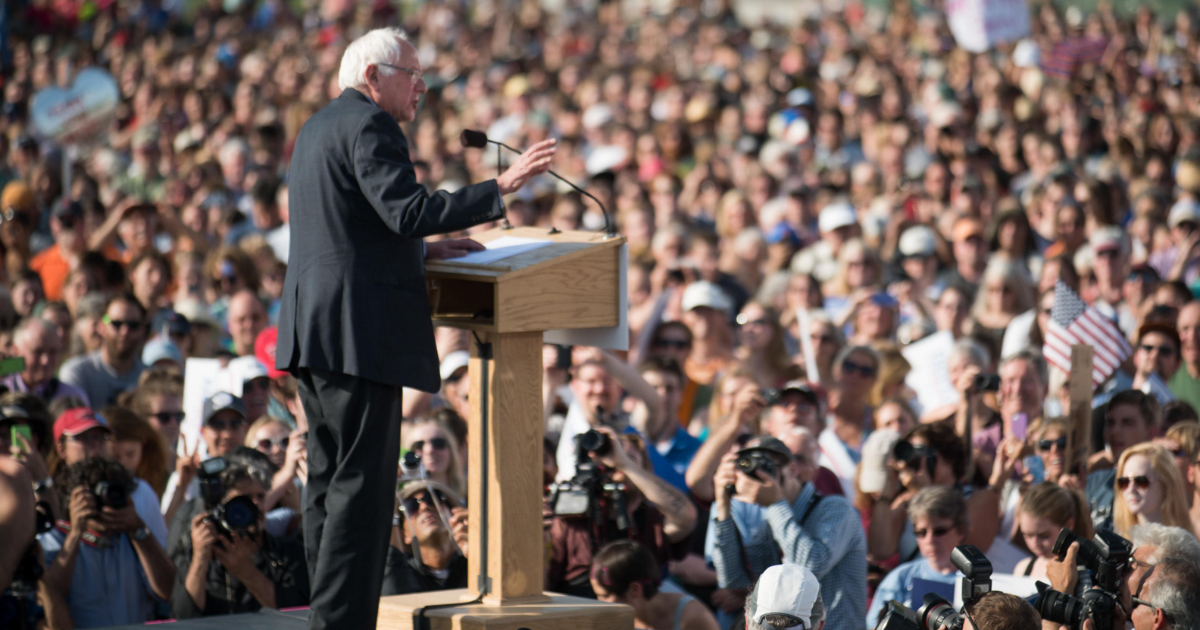Vermont Senator Bernie Sanders, a self-proclaimed democratic socialist, is without a doubt a hero among Progressives. When rumors began surfacing that Senator Sanders was considering a run for the White House in 2016, it stirred up genuine, if cautious, optimism.
The Progressive community will be popping the champagne corks as Senator Sanders announces his candidacy. This is indeed thrilling news – but it needs to be tempered with a dose of reality.
For years, Senator Sanders has been fearlessly outspoken about everything that is wrong with America’s economic system – focusing on the merciless decimation of the middle class, Wall Street’s obsession with theft and gambling, corporate bailouts at taxpayer expense, a tax code that blatantly favors billionaires and global corporations, a dysfunctional profit-driven health care system that literally kills thousands every year, so-called “free trade,” the bloated defense budget that robs education and social programs – the list goes on and on and on…
What is significant is that, outside of Progressive radio and web programs, the voice of “America’s Senator” (as Thom Hartmann has dubbed him) isn’t heard very much in the media. When it is presented in person to the general public however, his message finds willing ears. Over the past few weeks, he has been traveling to several states that hold early primaries. By all reports, people have been agreeing with what they’ve been hearing.
If the fact that the voters of Vermont have consistently returned Bernie Sanders to Congress every year since 1991 is any indication, his message of economic populism resonates with voters on both sides. Between 1992 and 2008, Vermont went Republican in presidential elections as often as it went Democratic. Yet the fact that Vermont voters choose a socialist to represent their interests in the national legislature during that time speaks volumes. (Bernie Sander’s colleague, Senator Patrick Leahy, is also a progressive Democrat and has been representing the Green Mountain State for four decades).
Now, it’s time for that dose of reality.
Bernie Sanders’ chances of actually winning the Oval Office are slim to none. Aside from his openly adversarial relationship with the corporate mainstream media and Wall Street, he is up against Democratic front-runner Hillary Clinton. The former First Lady has tremendous advantages in terms of fund raising and name recognition. She has also been accused of equivocating. For example, on the one hand, she admits that the “free trade” agreements her husband championed have “failed to live up to their promises,” but on the other hand, she has yet to speak out against the highly unpopular Trans-Pacific Partnership that is set to be “fast-tracked” through Congress. Ms. Clinton has also acknowledged (quoting Alan Ehrenhalt) that unregulated capitalism has been “the most radically disruptive force in American life in the last generation.” Yet, maintains a “cozy” relationship with Wall Street and the financial services sector – which is ready and willing to shower her presidential bid with plenty of cash.
There is another aspect to all of this that many voters fail to consider.
Constitutionally, the powers of the President are limited when it comes to domestic issues. As We, The People have (hopefully) learned since January 2009, the Executive Branch cannot do much of anything without the cooperation of Congress. Decisions and actions taken by the White House have far less effect on citizens’ everyday lives than those of Congress and state legislatures. This suggests that Bernie Sanders can do more good in his present role as Congressman and Senate member of the Progressive Caucus.
That said, Senator Sanders’ entry into the Presidential race is going to force other candidates, including Clinton, to acknowledge and debate those populist issues that are of primary concern to a clear and increasing majority of Americans of all stripes.
It’s the smartest and best thing America’s Senator can do for the Progressive cause.


